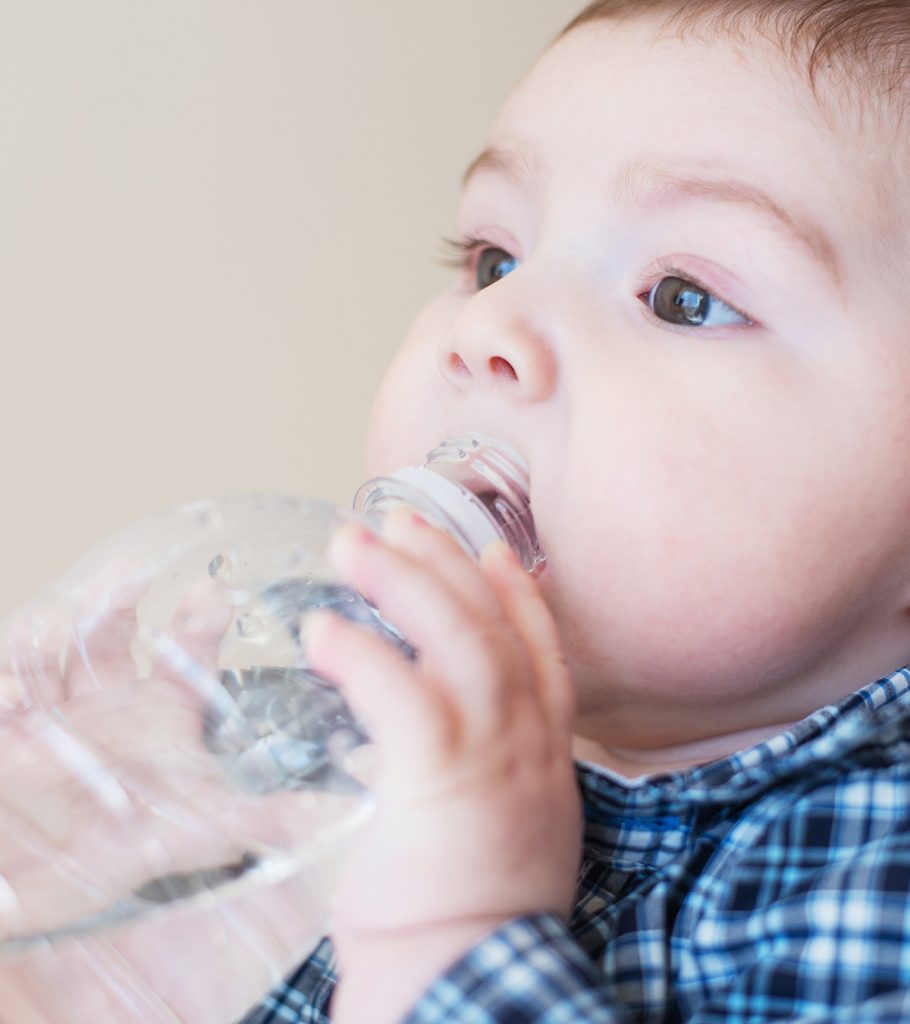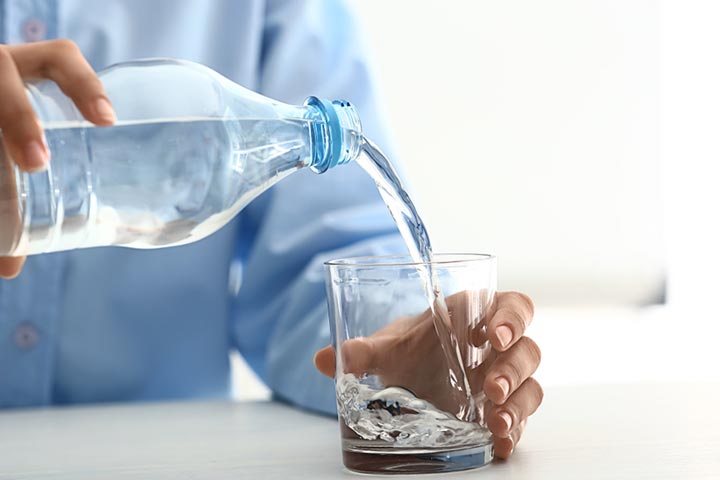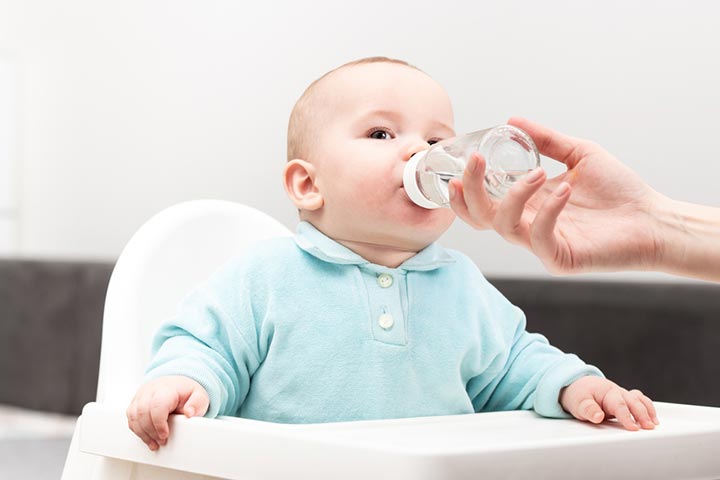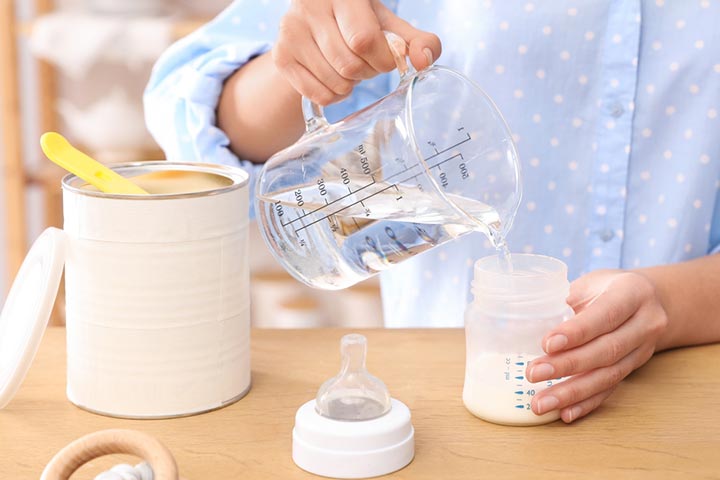Consider this scenario: you’re out with your infant on a warm, bright day, and they are thirsty, but you’ve forgotten your baby’s water bottle at home. So, when you have no other choice, you go to a store and buy bottled water. But is it safe to drink bottled water for babies? If you have concerns about giving bottled water to their babies, dive into this post as we answer all your questions about the safety of bottled water for newborns.
Can Babies Drink Bottled Water?
Yes, you can give bottled water to babies after they are older than six months. The US Food and Drug Administration (FDA) states that you can give low-fluoride bottled water to your baby when it is necessary (1).
The UK Government’s National Health Service (NHS), however, states that you should boil the bottled water before using it to make infant formula for your baby (2). This is because the bottled water may not be sterileiXFree from disease-causing microorganisms and may contain too much sulfate or sodium.
Bottled water is safe but which type should you choose?
Types Of Bottled Water
There are three types of bottled water: mineral water, packaged drinking water, and distilled wateriXPure water obtained after heating it until it becomes vapor and condensing it back into a purified liquid.
- Mineral water contains high quantities of total dissolved minerals. This mineral content could be present naturally in the water extracted from the ground (groundwater) or taken from a natural underground spring (spring water). Alternatively, a manufacturer may add minerals that make the water tasty and good for health as well.
- Packaged drinking water goes by several names such as packaged water, purified water or packaged purified water. Sourced from lakes, rivers, or even public taps, the water goes through UV treatment and reverse osmosisiXA water purification method that utilizes a semipermeable barrier to filter impurities for improved taste. Packaged drinking water contains a few natural minerals that give the water its distinct flavor.
- Distilled water is water in its purest form, without the presence of any dissolved gases or minerals. It is seldom sold for dietary consumption and is used for industrial purposes. It tastes bland.
Therefore, when you buy bottled water in the supermarket, it is most likely to be mineral water or packaged drinking water.
What Are The Bottled Water Requirements For Babies?
According to the US FDA and the NHS, bottled water for babies should meet the following requirements:
- Less sodium: The sodium (Na) content should be less than 250mg per liter of water.
- Low sulfate: Less than 250mg of sulfate (SO4) in a liter of water.
- Select “low-fluoride” versions: Most packaged drinking water, even those with added mineral content, have an average of 0.11mg of fluoride per liter or ppm (parts per million), which is safe for babies. If a version with lesser fluoride or fluoride-free is available, then that can be your choice.
Can You Boil Bottled Water?
Yes, you can boil bottled water, although it may not be necessary if it is manufactured by a reliable brand.
Boiling water is good if you are not sure of the quality of the water. Bring the water to a rolling boil and continue boiling for a minute to ensure that the germs are killed. Since boiling may not be an option when traveling with a baby, it is best to buy bottled water from a trusted place and brand.
Nataliya, a mother of a toddler, speaks about using bottled water for her baby daughter when traveling. She says, “Water is the main cause of many illnesses. So, only use bottled water. Some people also boil the bottled water and then use it, but I haven’t had to do that for Anya (my daughter) yet. My mom boils filtered water, so I would use that to wash bottles, etc., but otherwise, I would suggest using bottled water to wash those too (i).”
Can Bottled Water Replace Tap Water?
The American Academy of Pediatrics states that tap water is good enough and there is no need to choose bottled water unless tap water contains known contaminantsiXChemicals or impurities that make water unfit for drinking and harm human health (4). Choose bottled water when you do not have access to hygienic tap water.
What Is The Difference Between Baby Water And Bottled Water?
Baby water, also sometimes called nursery water, is bottled water packaged specifically manufactured for babies. Baby water is similar to regular bottled water, and there is no substantial difference between the two.
Current market research shows a rising trend in the baby drinking water market size, primarily owing to babies’ weaker or underdeveloped immune systems, which makes normal drinking water (containing high fluoride and sodium levels) unsuitable for babies. As shown in the graph below, the market size of baby drinking water is expected to grow at a compound annual growth rate (CAGR) of 10.3% from 2021 to 2027, reaching over US$ 61.94 billion by 2027.
Expected growth in baby drinking water global market (2020-2027)
Source: Baby Drinking Water Market; Precedence Research
Can You Use Bottled Water For Baby Formula?
Yes, you can use bottled water for making infant formula. Experts state that it is safe to use bottled water for preparation of infant formula, provided it is sterile or boiled for at least one minute (5). If the bottled water is labeled as ‘sterile’ by the manufacturer and meets the FDA standards, you can use it to prepare infant formula without boiling it further.
Bottled water for babies is safe if the baby is about the age of six months, and it is packaged as drinking water with mineral content. However, it is advised that you carry your little one’s bottle and boiled water along with you while taking them out for a stroll or a walk to reduce the incidences of having bottled water and also ensure baby hydration. It is also essential that, if need be, you buy the water from a reliable brand so that you do not have doubts about its constituents and purity.
Key Pointers
- Bottled water may be given to babies over six months old, but boiling it before formula preparation is recommended.
- There are different types of bottled water available, including mineral water, packaged water, and distilled water.
- The US FDA and NHS suggest choosing bottled water with low levels of fluoride, sodium, and sulfate for infants.
- Using bottled water from a reputable brand and boiling it before use can lower the risk of infection.
- Baby water (packaged water for babies) and regular bottled water are similar and do not have any significant differences.
Discover if bottled baby water surpasses tap water for your child in this informative video. Uncover the facts and make an informed decision tailored to your baby’s needs.













